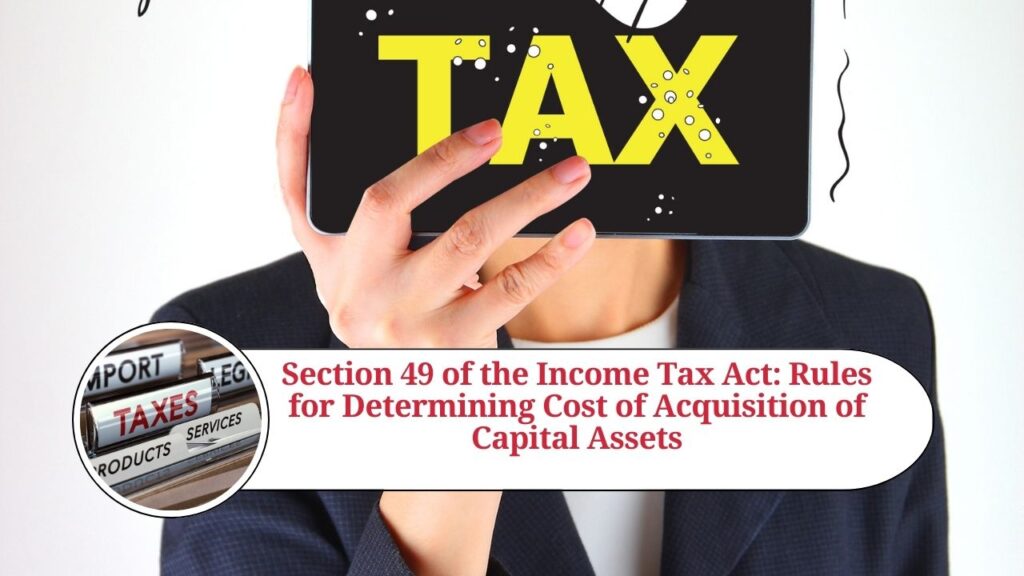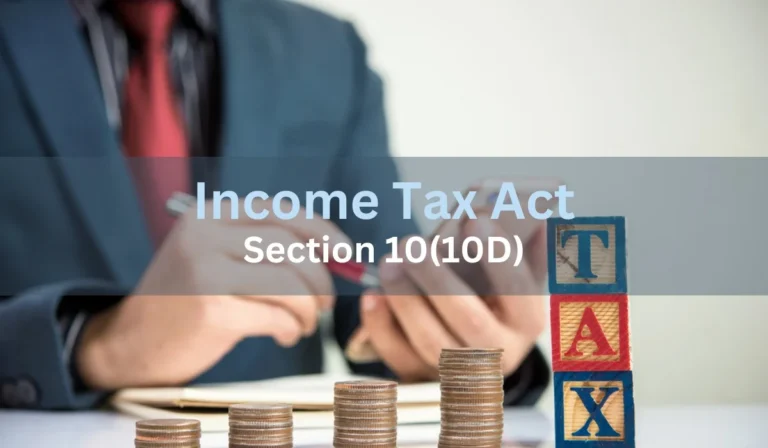Understanding Section 49 of the Income Tax Act: Cost of Acquisition for Capital Gains
Introduction
Navigating the intricacies of tax laws can be challenging, especially when it comes to understanding the cost of acquisition for capital assets. Section 49 of the Income Tax Act, 1961, provides clarity on this aspect, particularly in scenarios involving conversions, successions, and other specific situations. This blog aims to demystify Section 49, explaining how the cost of acquisition is determined in various circumstances, supported by relevant case laws and legal precedents.
What is Section 49?
Section 49 of the Income Tax Act deals with the cost of acquisition of capital assets in certain specific scenarios. It lays down rules for determining the cost of acquisition for computing capital gains when the asset is acquired through modes such as inheritance, gift, conversion of securities, and other specified transfers.
Key Provisions of Section 49
Conversion of Debentures to Shares
When debentures are converted into shares, the cost of acquisition of the shares is the part of the cost of the debentures in relation to which the shares are acquired. This ensures that the capital gains computation reflects the true economic cost to the investor.
Case Law:
Mrs. A. Ghosh v. CIT (1983) 141 ITR:
It was held that the cost of acquisition for equity shares obtained through the conversion of debentures is the price that the debentures would have fetched if sold on the date of conversion.
Conversion of FCCBs into Equity Shares
For Foreign Currency Convertible Bonds (FCCBs) converted into equity shares, the cost of acquisition is determined based on the conversion price, which is typically the closing price of the shares on a recognized stock exchange on the conversion date.
Case Law:
- Kingfisher CLO Ltd. v. CIT (2019) 413 ITR (Bom)
- DIT v. Intel Capital Corporation (2020) 429 ITR 45 (Karn): The conversion price is considered the market price of the shares on the conversion date.
Conversion of Preference Shares into Equity Shares
When preference shares are converted into equity shares, the cost of acquisition for the equity shares is considered to be the part of the cost of the preference shares corresponding to the equity shares acquired.

Transfer Due to Succession
If a firm or proprietary concern transfers assets to a company under Section 47(xiii), the cost of acquisition includes:
- The cost for which the previous owner acquired the asset.
- Any cost of improvement incurred by the previous owner or the assessee.
Case Law:
CIT v. Budge Budge Amalgamated Mills Ltd. (1980) 122 ITR 561 (Cal):
Transfer by a court order is considered devolution by operation of law.
Demutualization or Corporatization of Stock Exchanges
In cases of demutualization or corporatization of recognized stock exchanges, the cost of acquisition is the aggregate of:
- The cost for which the previous owner acquired the property.
- Any cost of improvement incurred by the previous owner or the assessee.
Inheritance and Devolution
For assets acquired by inheritance, the cost of acquisition is:
- The cost at which the previous owner acquired the asset.
- Any cost of improvement incurred by the previous owner or the assessee.
Case Law:
CIT v. Manoj Bhupathi Vad (2019) 413 ITR 159 (Guj):
The relevant date for indexation is when the previous owner acquired the asset.
Distribution of Assets on Liquidation
When assets are acquired on the liquidation of a company, the cost of acquisition includes:
- The cost for which the previous owner acquired the property.
- Any cost of improvement incurred by the previous owner or the assessee.
Revocable Trusts
For assets acquired through a transfer to a revocable trust, the cost of acquisition is:
- The cost for which the previous owner acquired the property.
- Any cost of improvement incurred by the previous owner or the assessee.
FAQs on Section 49 of the Income Tax Act
1. What is Section 49 of the Income Tax Act?
Section 49 deals with the cost of acquisition of capital assets in specific scenarios, such as conversions, successions, and other specified transfers, for the purpose of computing capital gains.
2. How is the cost of acquisition determined when debentures are converted into shares?
The cost of acquisition of the shares is considered to be the part of the cost of the debentures in relation to which the shares are acquired.
3. What is the cost of acquisition for shares obtained through the conversion of FCCBs?
The cost of acquisition is the conversion price, which is the closing price of the shares on a recognized stock exchange on the date of conversion.
4. How is the cost of acquisition calculated for assets acquired through inheritance?
The cost of acquisition includes the cost for which the previous owner acquired the asset and any cost of improvement incurred by the previous owner or the assessee.
5. What happens to the cost of acquisition when assets are acquired on the liquidation of a company?
The cost of acquisition includes the cost for which the previous owner acquired the property and any cost of improvement incurred by the previous owner or the assessee.
6. Are there specific rules for determining the cost of acquisition for assets transferred to a revocable trust?
Yes, the cost of acquisition is the aggregate of the cost for which the previous owner acquired the property and any cost of improvement incurred by the previous owner or the assessee.
7. Can the cost of acquisition be indexed for capital gains computation?
Yes, in cases such as inheritance, the cost of acquisition can be indexed based on the date when the previous owner acquired the asset.
Conclusion
Section 49 of the Income Tax Act plays a crucial role in determining the cost of acquisition for various capital assets, ensuring fair computation of capital gains. Understanding these provisions can help taxpayers make informed decisions and comply with tax regulations effectively. Whether dealing with conversions, successions, or other specified transfers, the rules outlined in Section 49 provide a clear framework for calculating the cost of acquisition, supported by relevant case laws.
For more detailed information and case-specific advice, consulting with a SmartTaxSaver. tax professional is recommended.



